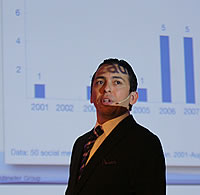
MyCustomer.com, a really good website on customer service, CRM and CEM, once asked Seth Godin if “CRM is dead.”
I think CRM is more alive than ever but is increasingly community-driven, cross-divisional, customer-controlled, integrated, interactive, connected, life cycle-based, value-focused and marketing-oriented.
It goes far beyond its traditional scope; it is the core in an integrated and customer-centric strategy. The convergence of social media and CRM has opened new opportunities for building customer relationships and changing, among others, how customer service is practiced.
Some call it Social CRM. And it’s not about platforms. It’s about processes and the way we look at customers and communities and how we involve them in our CRM activities. I believe CRM will become less marketing-oriented and more connected and integrated across multiple functions, revolving around the customer experience. And that’s about more than marketing.
Let me keep it simple: the most important words in customer relationship management are RELATIONSHIP and CUSTOMER.
CRM can be beneficial as businesses engage in communication with customers and prospects and as businesses involve the interactions happening in communities and the ecosystem around a brand, business or even topic.
A strategy and structure have to be in place for how customer feedback from social media will be taken advantage of and put into practice.
(Social) CRM and community interaction
Online communities provide feedback on specific aspects of products, services, business processes, needs, behavior, interaction, etc., allowing us to improve.

Brian Solis, who spoke at one of our events, also tackled the issue (in fact, he talks about it in his book Engage!). In the book, Solis introduced what he calls, SRM, or social relationship management. With the use of this term, he wanted to shift the focus away from the ‘social customer’, and instead wanted to pay more attention to Social CRM as an approach that takes place throughout the entire organization, without merely looking at customer service.
CRM and Social CRM indeed are about more than just customer service, but it’s definitely interesting to emphasize the cultural changes as well as the changes in mentality that are so crucial in a customer-centric business.
Adopting a customer-centric philosophy is always something that has to take place throughout the company. A lot of companies struggle while trying to do so, for instance, because of departments within the company that act like independent silos from one and another.
Brian Solis: SRM affects the whole organization and is transformational
According to Solis, ‘the ability to identify active communities of relevance’, tracing influential people and channels, and the dissection of all phases of the process of decision making, all in real-time, are crucial aspects of social media marketing.
Involving these ‘influencers’ and communities, and the linking of CRM to interactive marketing actions are some of the core elements of an integrated, social CRM.
More about the answers of Seth Godin to the question whether CRM is dead in the YouTube video of MyCustomer.com.

